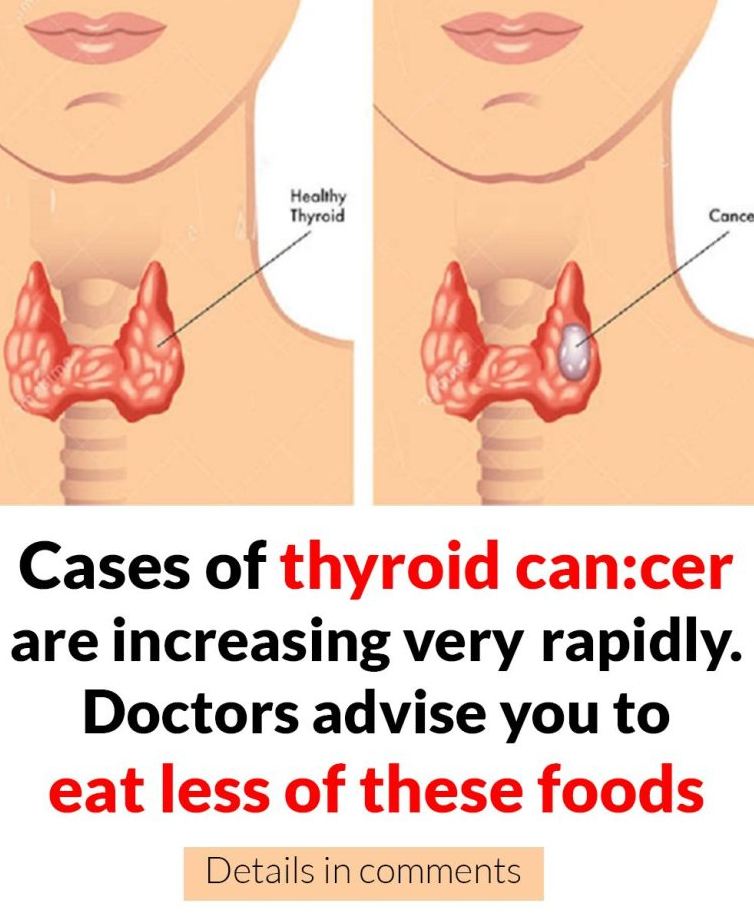-
Better Detection
Widespread use of imaging technology has made it easier to detect small thyroid nodules, even if they aren’t causing symptoms. -
Environmental Exposure
Exposure to radiation, especially in childhood, is a known risk factor for thyroid abnormalities. -
Diet and Endocrine Disruptors
Certain foods and chemicals can interfere with thyroid hormone production or overstimulate the gland.
Foods Doctors Advise You to Eat Less Often
Here are five key food groups that thyroid experts often recommend consuming in moderation — especially for those at risk of thyroid issues:
1. Processed Meats and Nitrates
Examples: Sausages, hot dogs, bacon, deli meats
Why: Processed meats often contain nitrates and nitrites, which are preservatives linked to cancer risk. These compounds can damage DNA and promote the formation of carcinogenic substances in the body. Studies suggest a possible correlation between high intake of processed meats and certain types of cancers, including thyroid.
Tip: Opt for fresh, lean protein sources like fish, lentils, or chicken without added preservatives.
2. Soy-Based Products (in Excess)
Examples: Soy milk, tofu, tempeh, soy protein isolate
Why: Soy contains isoflavones — plant compounds that can mimic estrogen and potentially interfere with thyroid hormone synthesis, especially in those who are iodine-deficient or already have an underactive thyroid. While moderate soy intake is generally safe, excessive amounts may not be advisable for those with thyroid conditions.
Tip: If you consume soy, make sure your iodine intake is adequate through iodized salt or seafood.
3. Cruciferous Vegetables (Raw and in Excess)
Examples: Broccoli, cauliflower, cabbage, kale
Why: Raw cruciferous vegetables contain goitrogens — substances that can inhibit the thyroid’s ability to absorb iodine. While cooking these vegetables significantly reduces goitrogen levels, consuming them raw in large quantities might impact thyroid function over time.
Tip: Steam or cook cruciferous vegetables and balance them with iodine-rich foods.
4. Sugary Foods and Refined Carbohydrates
Examples: Cakes, candies, sweetened beverages, white bread
Why: Diets high in sugar and refined carbs can lead to insulin resistance, which may be linked to an increased risk of thyroid dysfunction and potentially thyroid cancer. A diet high in sugar also promotes inflammation — a known factor in the development of chronic diseases.
Tip: Replace refined carbs with whole grains and reduce added sugar wherever possible.
5. Highly Iodized Foods or Supplements (in Excess)
Examples: Seaweed (like kelp), iodine supplements
Why: While iodine is essential for thyroid function, too much iodine can overstimulate the gland and may even trigger or worsen thyroid disorders. Excessive iodine intake has been linked to an increased risk of certain thyroid cancers, particularly in individuals already susceptible.
Tip: Stick to recommended daily iodine intake (150 mcg for most adults) and avoid mega-dose supplements unless prescribed by a doctor.
Protecting Your Thyroid Health
In addition to monitoring your diet, here are a few lifestyle tips to reduce your thyroid cancer risk:
-
Avoid unnecessary exposure to radiation (e.g., limit frequent CT scans unless medically necessary)
-
Get regular check-ups if you have a family history of thyroid disease
-
Exercise regularly to maintain hormone balance and reduce inflammation
-
Stay hydrated and eat a balanced, whole-food diet
Final Thoughts
While no single food causes thyroid cancer, your overall diet and lifestyle play an important role in maintaining thyroid health. Doctors aren’t asking you to eliminate these foods entirely, but moderation and balance are key. By being aware of the foods that may interfere with thyroid function — and focusing on nutrient-rich, whole-food alternatives — you take a proactive step toward better long-term health.
If you’re concerned about your thyroid or notice persistent symptoms, consult a healthcare professional for proper evaluation and personalized advice.
